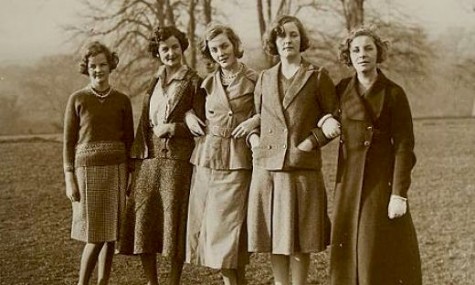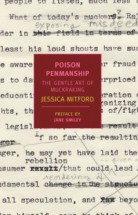
Reviewed:
Poison Penmanship: The Gentle Art of Muckraking by Jessica Mitford
NYRB Classics, 288 pp., $15.95
Jessica Mitford’s short 1962 travelogue “You-All and Non-You-All,” which recounts a sweep through a riven American south, was born of the journalist’s determination to “see how the people really live.” Mitford, a Briton who moved to America during her twenties and, more than two decades later, became one of her generation’s preeminent journalists, observed the people living in a manner that demanded some down-home phonetic transcriptions of their speech. Her narrative is largely atmospheric, and includes a memorable visit to a Montgomery country club, which was likely reeling from the recent bus boycotts, with its members spouting a “talk” that “was all but incomprehensible, their ‘y’alls’ [ringing] out like Rebel Yells.” (To demonstrate that no political sympathy was safe from her leftist ear, Mitford quoted an integrationist lawyer: “You should tra meetin’ Kissin’ Jim Folsom. That’d open yo’ ass.”) Though Mitford heard the drawls and idioms of her subjects as peculiarly regional, it is hard to imagine any other writer — American or not, southern or not — treating the area with a similar sense of novelty, alienation, and perverse fascination.
The piece is collected in Poison Penmanship: The Gentle Art of Muckraking, a 1979 anthology of Mitford’s short-form journalism recently reissued by NYRB Classics with a brief new preface by Jane Smiley. The volume spans much of Mitford’s writing life, and it hosts the germs of her influential book-length works on the California prison system and the funeral industry. Her more disposable pieces are also here — one about an overpriced New York restaurant, another on an inpatient spa — all on view to convey what a writer must do to entertain herself (and the concessions she must make to good money). The articles are ordered chronologically, beginning with a stiff, pithy piece about “the evil of trial by headline,” and how presumptive news coverage of ongoing trials informs the trials themselves. Yet even the worst pieces in Poison Penmanship are redeemed by the mature Mitford’s candid and instructive “comments” that follow, in which we learn not only of the lasting public policy responses to some of her stories, but also that the tawdrier commissions were the better compensated.
In this survey of her work, Mitford stretches the accepted notion of what muckraking is or was — while seminal exposés of industrial incompetence and greed, like Rachel Carson’s and Ralph Nader’s, were published in the decade of Mitford’s ascendancy, muckraking is historically the province of early-20th-century American Progressivism, a province to which Mitford, despite her progressive politics, does not belong.
In her foreword, Smiley refers to Mitford as American without hesitation, and why should she hesitate? Mitford became an American citizen later in her life, and her career, almost all of which was committed to the explication of American blights, unfolded entirely upon American soil, largely within American publications. And yet there are important tonal elements in her writing that betray her Britishness. (One can see some of these elements in Terry Castle’s satirical example of the “Mitford-Sister idiom”: “Last night I attended the grad student beer bust, and it was quite dreadful. Full of young men with beards, older sullen professors. Revolting scenes.”) Mitford wields a well-enunciated British wit that gives an occasionally disjunctive cast to her descriptions of the American South and Midwest, but she never fails to register the subtle inflections and linguistic transgressions of ordinary Americans talking.
Mitford’s topic was almost invariably, often surreptitiously, some symptom of American capitalism, a topic she approached with the same awe and rigor that she harnessed when unpacking the idiosyncrasies of American speech. More specifically, her abiding topic was The Swindle, that quintessentially American outcropping of avarice, its lurid interest no doubt heightened by her communist politics and her initial foreignness. There is a sequence in Mitford’s first book, the memoir Hons and Rebels (also revitalized by NYRB Classics), in which she describes all the disingenuous pitches and promises she made to unsuspecting customers during her brief tenure as a door-to-door stocking saleswoman, a job she performed with her late husband, Esmond Romilly. She would give customers “the famous ‘Third Degree’ of which we had read so much both before and after coming to America.” She was electrified by this experience, and the pressure and ingenuity of the salesperson continued to captivate and repulse her throughout her career.
 Mitford’s landmark book on the funeral industry, The American Way of Death, shows undertakers contriving and exploiting financially favorable ideas about what bereavement is. Mitford emphasizes the hideous, corporeal aspect of dead bodies throughout the text, so as to undermine the diversionary appeals to grief and memory made by undertakers when they sell an expensive funeral. In the index — the book is extremely thorough — of undertakers’ egregiousness, one sees the industry become a metonym for American capitalism’s maw. She offers a chilling conception of ethics that all but announces its applicability to wider contexts: “To be ‘ethical’ merely means to adhere to a prevailing code of morality, in this case one devised over the years by the undertakers themselves for their own purposes.”
Mitford’s landmark book on the funeral industry, The American Way of Death, shows undertakers contriving and exploiting financially favorable ideas about what bereavement is. Mitford emphasizes the hideous, corporeal aspect of dead bodies throughout the text, so as to undermine the diversionary appeals to grief and memory made by undertakers when they sell an expensive funeral. In the index — the book is extremely thorough — of undertakers’ egregiousness, one sees the industry become a metonym for American capitalism’s maw. She offers a chilling conception of ethics that all but announces its applicability to wider contexts: “To be ‘ethical’ merely means to adhere to a prevailing code of morality, in this case one devised over the years by the undertakers themselves for their own purposes.”
The most notorious piece in Poison Penmanship, “Let Us Now Appraise Famous Writers,” is the fullest demonstration both of Mitford’s power and her interest in the swindle. It examines the extant Famous Writers School, which, at that time, bore the imprimaturs of many well-known writers and publishers who proved to have had, at best, a tenuous relationship to the institution. The FWS was something like a for-profit trade school that afforded its graduates degrees of dubious currency, banking on an apparent exclusivity — an admissions committee nominally probed the writing samples of its applicants for “talent” — to increase enrollment.
The impressiveness of the piece rests in Mitford’s tirelessness and her even temper: Though the school reads like a scam on its face, Mitford musters the investigative brio to extract every possible embarrassment from the enterprise, gaining enough trust from the school’s figureheads to wrangle staggering self-indictments from them. She quotes one Famous Writer, Paul Engle, a former director of the Iowa Writers’ Workshop, as he explains his lack of involvement with FWS: “There’s a distinction between the Guiding Faculty, which doesn’t do very much, and the Teaching Faculty, which actually works with the students — who’ve spent really quite a lot of money on the course!” The school is the type of ruse that seems so commonplace, so unworthy of developed curiosity, that few American writers would ever bother to locate and make a story of its misdeeds. Mitford shows the rewards that can be gained by doing exactly this.
It is this thoroughness that inclines one to trust a journalist. When Mitford slipped in this regard, she could not forgive herself. Concerning an investigative failure during her research for “Let Us Now Appraise Famous Writers,” Mitford commented after the fact:
I had spent much of my day at the school watching the instructors at work — why had I not asked to see some of the “two-page personal letters of criticism and advice” promised in the advertising? Why had I not quizzed Mr. Lawrence as to whether I had been shown the entire premises — was there anything interesting in the basement that I might have overlooked? To this day it pains me to think of this lapse in my investigation, and I only relate it here as a solemn warning to the would-be muckraker to take nothing for granted, and never to be lulled into the assumption that one’s research is beyond reproach.
Though what Mitford describes might seem a trivial oversight to the lay reader, her self-flagellation speaks to her journalistic integrity. It also reveals her pedantic mercilessness, her commitment to laying her opponents entirely bare. There are plentiful examples of contemporary American journalism as damning as Mitford’s can be, but for few of them is the task pure bloodsport. In her introduction to Poison Penmanship, Mitford, with characteristic sharpness and mirth, suggests that the impulse underpinning her work is a sadistic one: “I wish I could point to some overriding social purpose in these articles; the sad truth is that the best I can say for them is that I got pleasure from mocking these enterprises and the individuals who profit from them.”
Daniel Pearce is a writer living in New York.
Mentioned in this review:

